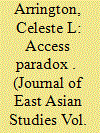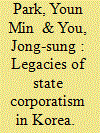|
|
|
Sort Order |
|
|
|
Items / Page
|
|
|
|
|
|
|
| Srl | Item |
| 1 |
ID:
159181


|
|
|
|
|
| Summary/Abstract |
To what extent is a diverse news media environment good for activists who seek attention for their cause? Scholars agree that activist groups depend on the media to reach policymakers and bystanders. Yet prior scholars have overlooked how factors that contribute to media environment diversity—including journalistic norms, market structures, outlets’ partisanship, and audiences’ news consumption habits—can have contradictory implications for activist groups. Disaggregating questions of gaining publicity from questions of the message and reach of coverage, this article shows that while pluralistic media environments are more accessible to activists, more homogeneous media environments help groups that manage to break into the mainstream news reach wider audiences with more coherent narratives. These findings challenge common assumptions about the news media in Japan and Korea. A paired comparison of hepatitis C-related activism in both countries demonstrates how the forces democratizing access to the media are paradoxically reducing the persuasive potential of publicity.
|
|
|
|
|
|
|
|
|
|
|
|
|
|
|
|
| 2 |
ID:
159182


|
|
|
|
|
| Summary/Abstract |
Regarding the causes of the Sewol ferry accident that claimed 304 lives in April 2014, some scholars have blamed neoliberal reforms such as deregulation and privatization for the safety regulatory failure. Others have highlighted the role of industry influence and corruption. Our analysis shows that regulatory capture was the crucial causal factor; moreover, this capture was institutionalized from the state-corporatist arrangements of the authoritarian period rather than reflecting new arrangements under the democratic era or corruption per se. The delegation of the critical safety regulation enforcement to the shipping industry association was not introduced as a neoliberal reform but in the context of state corporatism of the Park Chung-hee regime. Democratic governments continued to protect the monopoly of the lucrative Incheon–Jeju ferry business, contrary to neoliberal logic. The legacies of state corporatism persist despite post-financial crisis reform.
|
|
|
|
|
|
|
|
|
|
|
|
|
|
|
|
| 3 |
ID:
159180


|
|
|
|
|
| Summary/Abstract |
In the 1990s, a part of the North Korean economy underwent a process of marketization and de facto privatization. While largely spontaneous, this process was eerily reminiscent of developments in other post-Communist countries in Eastern Europe. One of the results was the emergence of a new entrepreneurial class, a nascent bourgeoisie. In order to overcome the obstacles that arose from the lack of any legal framework for their activities, they often chose to register their enterprises with state agencies, creating what we call Pseudo-state Enterprises (PSEs). Utilizing an agency theory approach, with particular emphasis on property rights and contracting problems, this article traces the origin of the PSE, their interaction with the state, how they are managed and the challenges they face. The article is based on refugee interviews with five North Koreans involved with the PSE-related activities in nine entities covering a range of different sectors.
|
|
|
|
|
|
|
|
|
|
|
|
|
|
|
|
| 4 |
ID:
159179


|
|
|
|
|
| Summary/Abstract |
This article aims to understand the policies of three major Northeast Asian states toward the Rome Statute and the International Criminal Court (ICC) that it established. Using a unique measurement tool, it traces the interactions of South Korea, Japan, and China with the Court since negotiations on its formation in the late 1990s. Included in this analysis is a focus on how Northeast Asian states have responded to recent efforts to bring North Korea into the Court's orbit for that country's military actions in 2010 and its human rights record over several decades. Data is based on publicly available documents as well as interviews with diplomats, legislators, legal experts, and activists in Japan, South Korea, and China conducted in 2015.
|
|
|
|
|
|
|
|
|
|
|
|
|
|
|
|
| 5 |
ID:
159178


|
|
|
|
|
| Summary/Abstract |
What underlying logic explains candidate participation in vote buying, given that clientelist exchange is so difficult to enforce? We address this question through close analysis of campaigns by several dozen candidates in two electoral districts in Java, Indonesia. Analyzing candidates’ targeting and pricing strategies, we show that candidates used personal brokerage structures that drew on social networks to identify voters and deliver payments to them. But these candidates achieved vote totals averaging about one quarter of the number of payments they distributed. Many candidates claimed to be targeting loyalists, suggestive of “turnout buying,” but judged loyalty in personal rather than partisan terms, and extended their vote-buying reach through personal connections mediated by brokers. Candidates were market sensitive, paying prices per vote determined not only by personal resources, but also by constituency size and prices offered by competitors. Accordingly, we argue that a market logic structures Indonesia's system of vote buying.
|
|
|
|
|
|
|
|
|
|
|
|
|
|
|
|
| 6 |
ID:
159183


|
|
|
|
|
| Summary/Abstract |
When do citizens take costly collective action against government corruption? When citizens act in concert, their demands are credible and not easily discounted by governments, which should be more likely to respond. In this study, we use the stag-hunt game, supplemented by Granovetter's threshold model of collective action, to investigate the conditions under which citizens coordinate to collectively act against government corruption. We use survey experiments in laboratory settings in Australia, Singapore, and the United States. The results show several conditions motivate participants to pursue collective action; using the wellspring of the theoretical argument, they clarify that information that others pursue collective action, together with clear mutual benefits as measured by rewards, are primary motivators of the individual's choice. Correspondingly, other considerations, including initial costs or final potential penalties, do not bear on the individual's choice. The findings have implications not only for the empirical literature on policy but also for policy debates on how to control it.
|
|
|
|
|
|
|
|
|
|
|
|
|
|
|
|
|
|
|
|
|